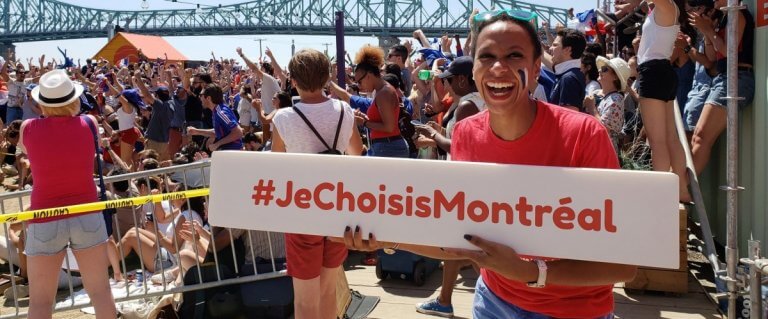
Montreal, Canada wants to retain international students who graduate from the region’s college or university. It has a campaign, called “Je Choisis Montreal” — “I choose Montreal” in English — which is trying to improve how it helps international students live, work and emigrate to the metropolis after graduating. One of the main ways it is doing is by highlighting the cost of living in Montreal, as well as through welcoming post-study policies.
“We want to improve the results…That’s why ‘Je Choisis Montreal’ was launched, to work with the Québec government and make sure those talents that have a degree or diploma from Québec stay and contribute to the economy of Québec,” says Student Projects Director Mathieu Lefort to CTV News
The lure of welcoming post-graduation policies for international students is strong in this Canadian city. What’s more, the city is ranked first among the Americas and fourth globally in the 2018 QS ranking of Best Student Cities.
Before you start packing your suitcase to get on the next plane to Montreal, here’s a little guide as to how much this new chapter of your life will cost:
1. Tuition fees
It generally costs less to study in Québec than elsewhere in North America. At the University of Montreal, for example, a Master’s costs CA$8,186 per session (CA$425 per thesis session) while a PhD costs CA$7,348 per session (CA$425 per thesis session).
Meanwhile, at Dawson College, full-time international students pay between CA$6,119 to CA$9,486 per semester depending on their programme. This amount is in addition to other applicable fees.
For more details on this, check out the Policy on tuition fees charged to foreign students by Québec universities.
2. Visa
A Canadian study permit (which acts as a student visa for the duration of your stay) will be required for courses or programmes longer than six months. Application for a permit costs CA$150, including extensions.
3. Accommodation
While Montreal’s rent prices used to be enviably low, things are now on the rise. In 2016, a handsome, spacious four bedroom apartment could go for CA$1,800 a month, as this The Globe and Mail piece states. Rent prices have gone up 13 percent in the past year – according to a recent ‘Canadian National Rent Report’ released by PadMapper.
Ranked fourth-highest in the county in terms of rent prices, expect to pay an average of CA$1,350 and CA$1,660 for one and two bedroom units respectively.
4. Food
Cost of living in Montreal is relatively low here compared to other large North American cities. For food, around CA$350 a month would be a comfortable budget to work around – it’s items like winter clothing and books for courses that will require large sums of money. Otherwise, cost of living in Montreal is pretty affordable compared to the rest of the country.

A street artist makes balloons to people at Jacques Cartier square in Old Montreal, Quebec. Source: Daniel Slim/AFP
Breaking that figure down further, Expatistan figures show a basic lunchtime menu (including a drink) in the business district is CA$16, while a combo meal in fast food restaurant (Big Mac Meal or similar) is CA$10.
As for groceries, a loaf of bread goes for CA$2.24, a litre of whole fat milk is CA$2.26 while half a kilo of boneless chicken breast is CA$6. Take note that goods and services tax (5 percent) and the Québec sales tax (9.75 percent) are collected on most consumer goods and services.
5. Transport
A monthly ticket for public transport costs CA$83, while an 8km taxi trip on a business day is around CA$32. Since the city is known to be a haven for cyclists, it makes more sense to invest CA$300 to get a new or used bike of your own.
6. Fun
Festivals are a regular feature in Canada’s second-largest city. While the costs for some are minimal, others like Osheaga costs CA$115 for general admission and CA$235 for gold passes. Other entertainment options like going to the movies would set you back CA$26 for two persons, CA$7 for a pint of beer and CA$45 for a dinner for two at a neighbourhood pub.
For fun free of charge, there’s always Mont Royal for the amazing views of downtown Montreal and the mountains over on the south bank. Bienvenue à Montréal!







